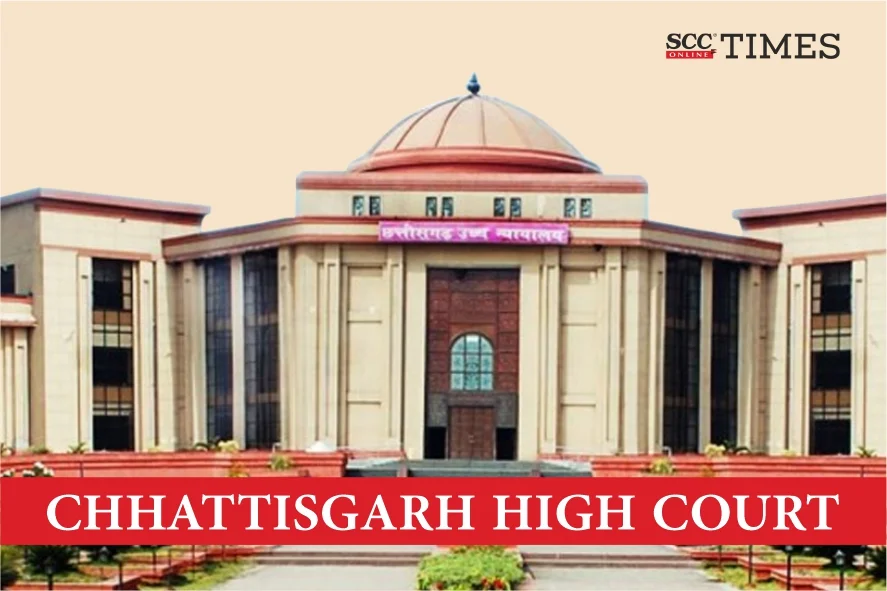Chhattisgarh High Court: An appeal was filed against the judgment dated 13-12-2023 passed by the Judge, Family Court, Dantewada (‘the Family Court’), wherein an application was filed by appellant claiming custody of their child, which according to the appellant was begotten out of the relationship with respondent, was dismissed. The Division Bench of Goutam Bhaduri and Sanjay S. Agrawal, JJ., opined that when one of the parties was Hindu and did not change her religion, the marriage would be an interfaith marriage and it would be governed by Special Marriage Act, 1954 (‘the Act’). Section 4(a) of the Act laid down a condition that marriage between two persons might be solemnized under the Act, if at the time of marriage, neither party had a spouse living. Therefore, the Court opined that even though appellant had a spouse living at the time of the second marriage, he performed the second marriage under the Act, which was void ab initio.
The Court opined that the live-in relationship which had been followed in certain sect of the society continued with a stigma in the Indian culture. Live-in relationship was an imported philosophy contrary to the general expectations of Indian tenets. In Indian tradition each of citizen possessed a sense of self that was unique and unlikely to be confused with imported traditions. There could not be more inglorious object than to adopt live-in relationship to destroy the interwoven culture in society and tradition. Thus, the Court agreed with the judgment dated 13-12-2023 passed by the Family Court and dismissed the present appeal.
Background
In the present case, appellant followed Muslim rituals, and respondent was governed by the Hindu law. The application showed that they were in live in relationship for three years. Thereafter, in 2021, without conversion, the parties got married. As per the averments, respondent was appellant’s second wife as he was married earlier and from his first wife, he had three children. Appellant contended that the child was born out of their relation on 31-08-2023, and suddenly on 10-08-2023, appellant discovered that respondent and the child were missing. Thereafter, he enquired about the whereabouts and a habeas corpus petition was filed before the present Court. Subsequently, respondent appeared with her parents and stated that she was living with them as per own wish.
Appellant stated that they were in live-in relationship and performed an interfaith marriage. He further stated that he could maintain the child as he had a decent income. Thus, an application was filed before the Family Court, claiming custody of his child. However, the said application was dismissed. Thus, a present appeal was filed.
Analysis, Law, and Decision
The Court opined that the appellant’s pleading showed that there was an admission that the respondent continued to be Hindu and was second wife. Further, from his first wife he had three children. Moreover, the principle laid down in the marriages for Mahommedan, the capacity of marriage is to be in between Mahommedan and in the face of admission that one of the parties did not change her religion, it could not cloth the live in relationship of such continuation to say that marriage was under the Mahommedan rituals.
The Court opined that when one of the parties was Hindu and did not change her religion, the marriage would be an interfaith marriage and it would be governed by the Act. Section 4(a) of the Act laid down a condition that marriage between two persons might be solemnized under the Act, if at the time of marriage, neither party had a spouse living. Therefore, the Court opined that even though appellant had a spouse living at the time of the second marriage, he performed the second marriage under the Act, which was void ab initio.
The Court opined that the live-in relationship which had been followed in certain sect of the society still continued with a stigma in the Indian culture. Live-in relationship was an imported philosophy contrary to the general expectations of Indian tenets. In Indian tradition each of citizen possessed a sense of self that was unique and unlikely to be confused with imported traditions. There could not be more inglorious object than to adopt live-in relationship to destroy the interwoven culture in society and tradition.
The Court opined that a live-in relationship was preferred over marriage as it provided a convenient escape, when things failed to work between partners. If the couple wished to break up, they enjoyed the freedom to split unilaterally, irrespective of the consent of the other party and without having to go through the cumbersome legal formalities in the court. The security, social acceptance, progress and stability which the institution of marriage provided to a person was never provided by live-in-relationship. The Court opined that the close inspection of society showed that the institution of marriage no longer controlled the people as it did it in the past due to cultural influence of the western countries and this significant shift and apathy towards matrimonial duties had probably given rise to the concept of live-in relationship.
The Court further opined that “it is crucial to understand and protect the women in such relationship, as they are most often the complainant and victim of violence by the inmate partners of live-in relationship. It is very easy for the married man to walk out of the live-in relationship and in such case the courts cannot shut their eyes to the vulnerable condition of the survivor of such distressful live-in relationship and children born out of such relationship.”
Thus, the Court agreed with the judgment dated 13-12-2023 passed by the Family Court and dismissed the present appeal.
[Abdul Hameed Siddiqui v. Kavita Gupta, FA(MAT) No. 27 of 2024, decided on 30-04-2024]
Advocates who appeared in this case:
For the Appellant: Rajeev Kumar Dubey, Advocate;
For the Respondent: Virendra Verma, Advocate.







